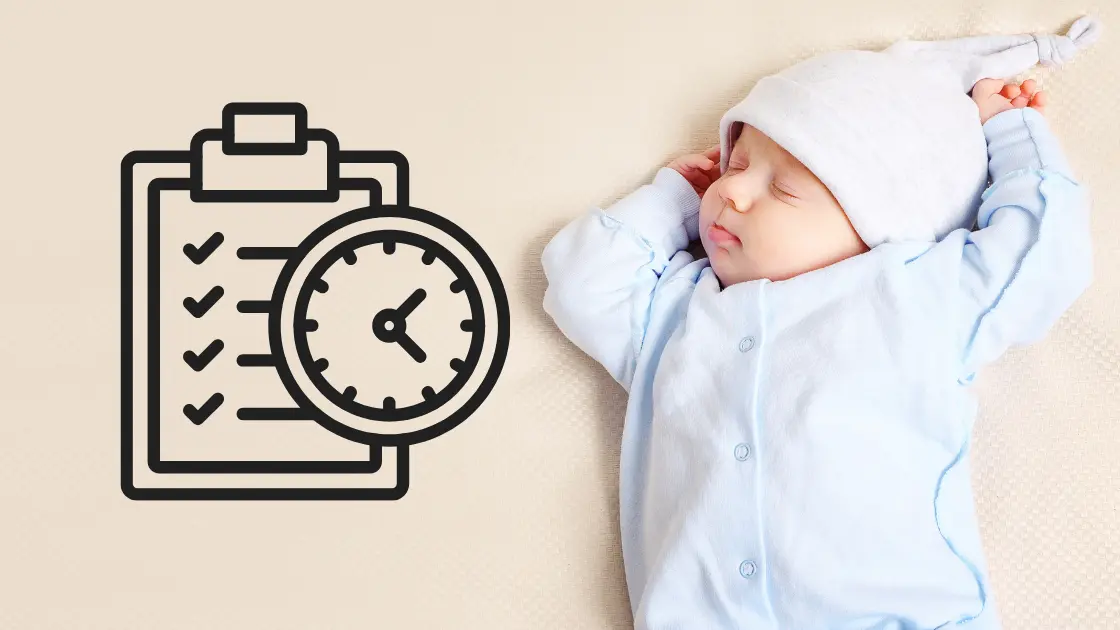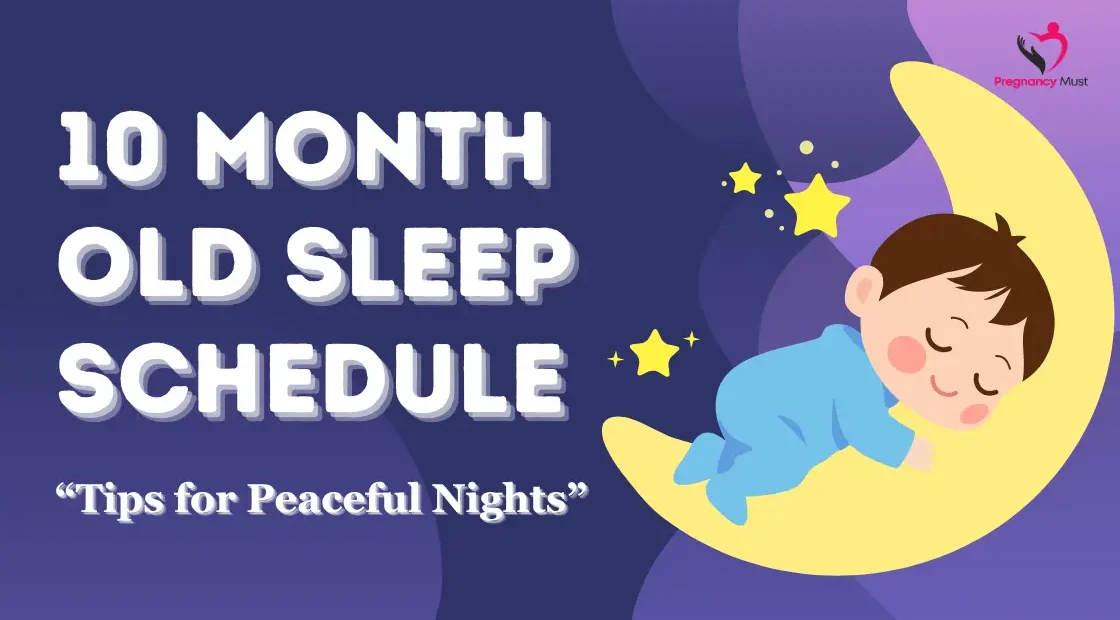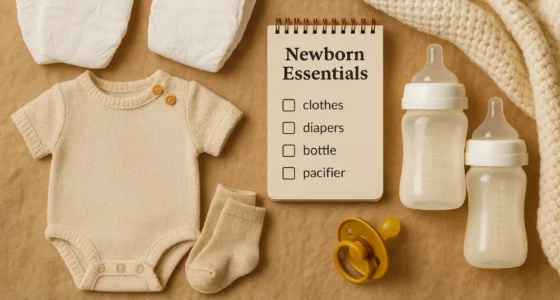A 10 month old sleep schedule can support good sleep habits and make sure your baby is getting the right sleep he needs to continue to thrive and develop. In this article, we will cover what you can expect at this level, how to create a healthy routine, and manage potential challenges. When your baby is 10 months old, they’re sleep schedule becomes an important part of their growth and development. As your baby grows, so do their sleep needs.
Table of Contents
- Understanding the Baby Sleeping Habit to Set a 10 Month Old Sleep Schedule
- Creating a 10 Month Old Sleep Schedule
- What About Other Baby Sleep Schedules?
- Signs That Your Baby Is Ready for a New Sleep Schedule
- Common Problems Regarding 10 Month Old Sleep Schedule and How to Solve Them
- Frequently Asked Questions (FAQs)
- Conclusion: 10 Month Old Sleep Schedule
Understanding the Baby Sleeping Habit to Set a 10 Month Old Sleep Schedule
10 month old sleep schedule is important as it can provide a perfect combination of sleep during the day and night. To have a good 10 month old sleep schedule, you should learn their evolving sleeping habits.
How Much Sleep Does a 10 Month Old Need?
A 10 month old typically needs between 12 and 14 hours of sleep per day. This includes a combination of both nighttime sleep and naps. Most babies at this stage sleep for 10 to 12 hours at night, with 2 to 3 hours of daytime naps.
But everyone’s sleep needs are different. There are probably some babies who need a little more sleep or a little less and manage just fine. Keep an eye on your baby’s mood and energy to get a sense of how much sleep he or she truly needs.
How Many Naps Does a 10 Month Old Need?
By 10 months of age, most babies take two naps per day. These naps are generally in the morning and afternoon and are a combined total of 3 to 4 hours. But some babies start transitioning to one nap as they get close to a year old, usually one that can be anywhere from 2 to 3 hours long.
Creating a 10 Month Old Sleep Schedule

Implementing a 10 month old sleep schedule is important for helping to develop healthy sleep habits and make sure that your baby is getting enough sleep. Most importantly, consistency is key — develop a rhythm around naps and bedtime and stick with it.
Morning Routine: The First Nap
While setting a 10 month old sleep schedule start with making your baby up at around 6:30am to 7:30 am. From there, it’s all about the consistency. The first nap is usually 2 to 3 hours after waking. Here is some advice about making that a successful first nap:
- Create a calm atmosphere: Sights and sounds should be muted before naptime or bedtime. Turn down the lights to signal its time to chill out, reduce noisy activities that could jolt your baby out of relaxation, and ensure the room is cool enough (between 68 and 72 degrees is best) for quality sleep.
- Comfort items: A baby blanket, soft toy, or pacifier can give your baby a sense of security and help them feel secure enough to drift off to sleep. They are comfort objects that make it easier for them to fall asleep or take a
- Consistent sleep environment: Routine is truly king for babies, and a consistent sleep environment supports the sleep schedule. Make sure the baby’s crib or bassinet is safe with a firm mattress and nothing soft and cushy (including a feeding pillow, blanket, stuffed animals, or any other toys in the crib) that would pose a safety risk to the child. A consistent sleeping environment is conducive to improved, restful sleep.
Afternoon Routine: The Second Nap
The second nap will typically be 3-4 hours or so after morning nap. This is usually in the early afternoon, around 12:30 pm – 2:00 pm. This will be a nap of 1.5 to 2 hours. This adjustment to your 10 month old sleep schedule will help the baby sleep for long time at night.
- Avoid overstimulation: Before nap time, establish a restful environment. Keep it calm and quiet, minimizing play-time activities and any screen time that might stir or overstimulate This makes it easier for babies to make the transition into sleep, as they won’t be extremely alert.
- Same sleep environment: You want to make sure your sound machine plays the same noise, at the same volume, at the same time in the same room each day. Make certain your baby naps in the same place every day, whether that is in a crib or a certain A familiar environment allows baby to learn the easy association between the sleeper and sleep, reducing interrupted sleep and allowing for a better night’s sleep.
Bedtime Routine: Preparing for Nighttime Sleep
Having a consistent bedtime routine can help signal to your baby that it’s time to wind down for the night. You will ideally want them to start this bedtime routine around 6:30 -7:00 pm and have them in bed by 7:30 – 8:00 pm.
Key points for a bedtime routine:
- Calm and relaxing activities: A quiet bedtime ritual, such as a warm bath or a few minutes of rocking or feeding, followed by a lullaby, can help the baby wind down. These actions are reassuring, and they give your baby a sense of security as he winds down to sleep.
- Avoid stimulating activities: Playtime is over and you’re trying to wind down your little one from a long day, so it’s essential to avoid stimulating activities before bed. Steer clear of active play, screen time, or loud music, all of which can stimulate your baby and push off the sleep transition. The idea is to keep stirring your baby to a minimum to help promote a sense of calm before bed.
What About Other Baby Sleep Schedules?

While the 10 month sleep schedule is essential, it’s helpful to understand how your baby’s sleep needs will evolve as they grow.
- 7 Month Old Sleep Schedule: At 7 months, 14 hours of sleep is usually about average, with naps continuing to be about 1.5-2 hours each. The first nap is generally in the morning, and the second one in the afternoon. These naps help to recharge the baby, but still get with plenty of sleep at night.
- 8 Month Old Sleep Schedule: For your 8-month-old sleep schedule is basically the same as the 7-month-old schedule, with two naps. That said, your baby’s wake windows can slowly work their way up to 2.5 to 3 hours instead. Your little one might also start getting interested in more active-play type games at this age, so take note of how this may affect their sleep.
- 9 Month Old Sleep Schedule: At this age, some babies start moving toward a more consolidated sleep schedule. This indicates the 2nd nap may end, and the overall nighttime sleep interval extends up to 11-12 hours. But it isn’t unusual for some babies this age to still require two naps.
- 11 Month Old Sleep Schedule: 11-month-olds are, for the most part, ready to be sleeping just one nap during the day, though some will still need two naps during the day. Babies typically sleep 11 to 12 hours overnight at this age and take a 5 to 2-hour nap during the day. And the trick is in the timing.
- 13, 14, and 15 Month-Old Sleep Schedules: These months mark the transition to one nap per day for most babies. Babies at 13 months will take one longer nap during the day, usually between 1.5 to 2 hours. At 15 months, they typically do better with naps, getting 1.5 to two hours during the day and 11 to 12 hours at night with a more predictable schedule.
- 18 Month Old Sleep Schedule: At 18 months, the sleep schedule tends to become even more consistent. Most babies remain on one nap, stretching out to around 1.5-2 hours, and they tend to sleep 11-12 hours at night. This is a consistent phase of the sleep cycle with less interrupted patterns.
Here’s a representation of the breakdown of sleep schedules for babies at various ages.
Age | Total Sleep | Daytime Naps | Nighttime Sleep |
7 Months Old | 14 hours | 2 naps (3-4 hours) | 11-12 hours |
8 Months Old | 14 hours | 2 naps (3-4 hours) | 11-12 hours |
9 Months Old | 14 hours | 2 naps (3-4 hours) | 11-12 hours |
10 Months Old | 12-14 hours | 2 naps (3-4 hours) | 11-12 hours |
11 Months Old | 12-14 hours | 1-2 naps (2-3 hours) | 11-12 hours |
13 Months Old | 12-14 hours | 1 nap (1.5-2 hours) | 11-12 hours |
14 Months Old | 12-14 hours | 1 nap (1.5-2 hours) | 11-12 hours |
15 Months Old | 12-14 hours | 1 nap (1.5-2 hours) | 11-12 hours |
18 Months Old | 12-14 hours | 1 nap (1.5-2 hours) | 11-12 hours |
Signs That Your Baby Is Ready for a New Sleep Schedule
If your baby is showing the following signs, it may be time to adjust their 10 month old sleep schedule:
- Frequent wake-ups at night: If your baby is regularly waking up at night, it might be because of teething, sleep regression, or environmental factors. It’s then that a regular nighttime ritual and finding ways of keeping your baby comfortable can help diminish those middle-of-the-night wake-ups.
- Difficulty falling asleep at the usual bedtime: If your baby troubling to fall asleep at bedtime, they may be overstimulated or overtired. Creating a peaceful and relaxing pre-sleep environment, for instance, with a warm bath and lulling noises, will assist in letting your baby know it’s time to relax and rest.
- Refusing naps or taking shorter naps: If your baby is refusing naps or only taking shorter naps, it could be a sign that they are transitioning between sleep stages, such as moving from two naps to one. Gradually adjusting nap times and providing a quiet, comfortable environment for naps can help improve nap duration.
- Being overly tired or cranky despite having a regular routine: If your baby is still cranky or overtired despite a consistent sleep routine, he might need a tweak to his sleep schedule, like earlier bedtimes or longer wake windows between naps. And also be sure to pay attention to their sleep cues and make small adjustments to find what works best for them.
Common Problems Regarding 10 Month Old Sleep Schedule and How to Solve Them

Sleep Regression
Many babies have a sleep regression at 10 months because of developmental milestones like crawling or walking. Your baby may start waking more often during the night. To combat this, maintain a bedtime routine and make your baby’s sleep environment comfortable.
Separation Anxiety
At this stage, babies tend to go through a phase of separation anxiety, so they may be wary of being left alone. The act of rubbing your baby’s back with a soft item or your hand may be a comforting one for the child, which can make the transition into slumber a little bit easier for them.
Teething
Another cause of sleepless nights can be teething. If your baby is teething, offer him teething rings or a cold washcloth for the pain. Talk to your pediatrician about safe teething aids.
Frequently Asked Questions (FAQs)
How do I establish a sleep schedule for my 10 month old?
Start with a casual morning routine and nap schedule. Create a calming bedtime ritual and nighttime/napping environment for your baby.
How long should a 10 month Old sleep at night?
Typical 10 month old sleep schedule includes 11 to 12 hours of sleep at night according to general 10 month old sleep schedule If your baby is waking up frequently, it may be time to assess the environment or routines.
When will my baby drop their second nap?
Most babies transition to one nap between 12 and 18 months. Look for signs of readiness, such as longer wake windows or resistance to the second nap.
What if my 10 month old is not following the sleep schedule?
If your 10 month old baby is having trouble with the 10 month old sleep schedule, look for underlying causes like teething or developmental shifts. Consistency is everything, but so is flexibility as your baby grows.
Conclusion: 10 Month Old Sleep Schedule
To sum it up, 10 months old sleep schedule is all the difference to not just your baby’s sleep habits but yours as well. If you maintain regular nap times, bedtime routines, and sleep settings, you will help your baby sleep better and develop better. Attending to their signals and adjusting the schedule as necessary will help lay the foundation for them to get what they need developmentally and help you have restful nights. Be patient and stay consistent; your little one will get into a healthy sleep schedule!
Explore more on Pregnancy Must –









